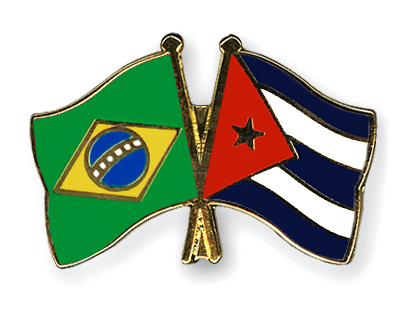Total Pageviews
Sunday 8 September 2013
The Brazilians are coming...
As Brazil is about to import 4,000 Cuban doctors to ease its shortage of medical professionals, it has been annunced that Brazil’s President Dilma Rousseff (pictured beklow with Raúl Castro) is expected to visit Cuba at the end of this year to attend the official opening of the Port of Mariel which is being built by Brazilian construction firm Odebrecht.
The first 700 metres of new berths at the port, situated about 35 miles West of Havana, are scheduled to be completed by December and the port is expected to be fully operational by next year.
The visit will be the second by President Rousseff to Cuba in two years and is a sign of deepening relations.
Brazil’s national development bank BNDES is financing 85% of the port project, including the creation of the adjacent Mariel development zone, with Cuba funding the remaining 15%. Almost all the supplies and services for the project are being provided by Brazilian companies.
The new Mariel Port will include facilities for offshore oil exploration and development, a container terminal with the capacity to store up to one million containers, along with general cargo, bulk and refrigerated handling facilities.
The Mariel terminal will provide access for large vessels of up to 15 metres draft, which cannot currently dock in Cuba. Mariel’s new facilities will be operated by the Port Authority of Singapore’s PSA Panama International, which is based in Panama City.
The special development zone will be operated by a subsidiary of GAESA, the Cuban military holding company and aims to encourage more foreign investors to produce high value-added goods and services for export in Cuba.
It is expected that beyond the industrial zone an area of residential property, hotels and other facilities are envisaged. The zone is covered by special laws and has a tax status that is different from that on national territory.
The government published a decree on 3 April 2013 detailing rules for the “maquiladoras”, the manufacturing plants in the free-trade zone that will import and assemble duty-free components for export. The decree establishes rules for the area and its operations, including customs fees, tax exemptions and exemptions from the payment of import taxes. Brazil indicated last year that it would be helping Cuba draw up a legal framework for special development zones.
“We have a lot of interest in cooperating in the definition of this model, in order to bring in the biggest possible number of Brazilian companies,” Brazil’s Foreign Trade Minister Fernando Pimentel said last year. Havana has said that it is interested in “more integration” between Cuban and Brazilian companies and is offering “technology transfer in exchange for investment in plants”.
The São Paulo-based glassmaker Fanavid has already indicated that it will open a manufacturing facility special development zone to supply Cuba, Brazil and the Caribbean region with architectural glass. Brazilian bus manufacturer Marcopolo could also be interested in opening a manufacturing plant in the zone, which lies 49km west of Havana, Cuban officials say. Marcopolo is the third-largest bus maker in the world.
BNDES has lent Cuba over US$40m since 1999 to buy buses and cars. Cuba secured a rotating credit facility of US$400m to Cuba last year for food purchases, as well as a US$200m loan from Brazil to fund Mais Alimentos Cuba, a food production programme to enable private farmers in Cuba to buy Brazilian-made tractors and other equipment, and benefit from Brazilian training and technology transfer. Brazil’s agriculture research institute Embrapa is also cooperating with Cuba on a number of projects, including one on soy and corn production, one to diversify sugar production, one on development and know-how transfer in biological pest control, and one on reducing heavy metals in agricultural products.
All the projects are funded by Brazil’s foreign-aid agency Agência Brasileira de Cooperação. Odebrecht, meanwhile, formed a joint production agreement last year with state company AZCUBA to operate a sugar mill in the province of Cienfuegos. Airport upgrades are also being carried out by Odebrecht and other Brazilian companies. BNDES agreed in May 2013 to provide US$176m for five airport modernisation projects in Cuba.
Brazil has also indicated that it is studying potential investments in generic pharmaceuticals, including anti-cancer drugs, petroleum refining, and the production of lubricants, while Cuban officials have said that Brazil and Cuba are studying projects in the areas of health care, education, computers and agriculture and livestock.
Subscribe to:
Post Comments (Atom)


No comments:
Post a Comment